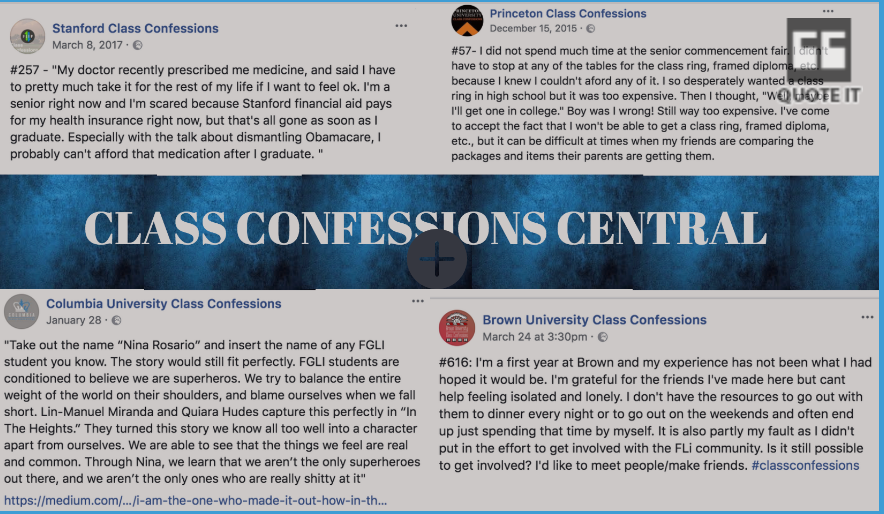Last week, I wrote about how rarely colleges and universities name the classism that low-income and working-class students experience on campus.
One exception to this was a project several years ago in which first-generation/low income students on elite campuses created "Class Confessions" social media pages where they could anonymously post their experiences with more privileged peers and faculty, talk about financial struggle in their families, or call out campus policies and practices that disadvantaged students like them.
Coordinated through the nonprofit First-Generation Low-Income Parternship (FLIP), the project produced hundreds of posts, such as these, from the FLIP website:

Goals of the project included making class differences more visible on elite campuses and to reduce isolation among lower-income students who'd recognize that they were not alone.
I remember following this project and admiring so many students for speaking up, while also being bothered that the project was called “Class Confessions”. I love a good alliteration as well as anyone, but wondered if anonymous confessions normalized shame around poverty and enforced a cultural unease around "poor" as a moral rather than an economic identity.
These campuses did not urge privileged students to “confess” the many advantages that families were providing for them, though these advantages are often concealed: the private tutoring and college admissions coaching, money for rent during unpaid internships and travel for service projects, parents who edit course papers, or even the opportunity hoarding of high resource schools that could hire the best teachers to work with the small numbers of students in state of the art labs and classrooms. A small number of privileged students did sometimes come into the Class Confessions pages to anonymously declare their allyship, but in years of following the project, I rarely saw cross-class dialogue.
Only a handful of the sites are still (as of today) up: Columbia, Brown, Northwestern. At Stanford, an undergraduate research project (with an incomplete lit review) did content analysis on their Class Confessions page. I learned by searching for information about the author that she herself was first-generation, but did not mention this in a paper analyzing a project intended to make class more visible at a place like Stanford.
Another earlier paper analyzed the dynamics of stigma management in an anonymous online space and found benefits for students and moderators on an (unnamed) campus.
I am still looking for other campuses where there is open acknowledgement of class differences and classism. I'm looking for other campuses where poor and working-class students aren't left to navigate these dynamics on their own.
Please do let me know of examples. I'd love to highlight them here.




